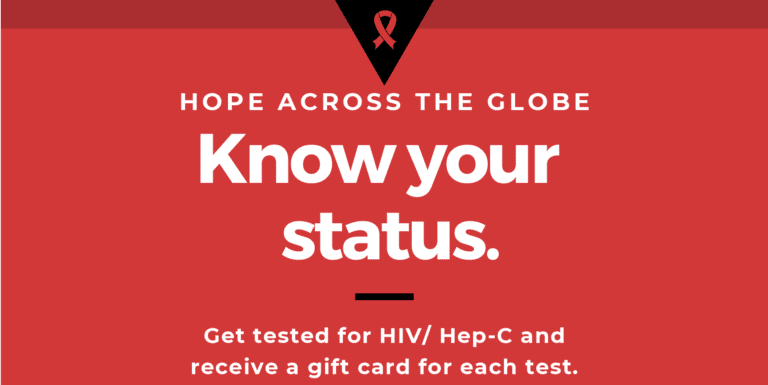What Is Usually the First Sign of HIV?
In the fight against HIV/AIDS, early detection and diagnosis are critical. HIV (Human Immunodeficiency Virus) is a complex virus that attacks the immune system and can lead to AIDS (Acquired Immunodeficiency Syndrome) if left untreated. Identifying the first signs and symptoms of HIV is essential for timely intervention and management. In this article, we will explore the early signs of HIV, the importance of HIV testing in Jacksonville, and the role of organizations like “Hope Across The Globe” in spreading awareness and providing support to individuals affected by this virus.
Understanding HIV
To comprehend the first signs of HIV, it’s crucial to understand the virus itself. HIV primarily attacks the body’s immune system, specifically CD4 cells (T cells), which help the immune system fight off infections. As the virus multiplies and destroys these cells, the immune system weakens, making the body more susceptible to various illnesses and infections.
The Importance of HIV Testing
Early detection is the key to effectively managing HIV. HIV testing is the primary method to diagnose the virus, and organizations like “Hope Across The Globe” play a vital role in promoting and facilitating HIV testing in Jacksonville. Timely testing is crucial for the following reasons:
Reducing Transmission
Getting tested and knowing one’s HIV status is essential for preventing the transmission of the virus to others. People who are aware of their HIV-positive status can take measures to prevent the spread of the virus to their sexual partners, reducing the risk of new infections.
Early Intervention
Early diagnosis allows individuals to access medical care and treatment promptly. Antiretroviral therapy (ART) can effectively manage HIV and slow the progression of the disease. The sooner treatment begins, the better the outcome for the patient.
Improved Health Outcomes
Timely diagnosis and treatment significantly improve the health outcomes for individuals living with HIV. It can help prevent the development of AIDS and its associated complications.
What Is Usually the First Sign of HIV?
Acute Retroviral Syndrome
The first signs of HIV often appear within two to four weeks after infection. This initial stage is known as Acute Retroviral Syndrome (ARS). Not everyone with HIV will experience ARS, and its symptoms can be mistaken for other common illnesses. The most common symptoms include:
Fever:
A persistent high fever, often accompanied by chills and sweats, is a typical symptom of ARS. It can be mild or severe and may last for a few days to several weeks.
Fatigue:
Extreme tiredness and fatigue are common during the early stages of HIV infection. Individuals may find themselves inexplicably low on energy and unable to carry out daily activities.
Swollen Lymph Nodes:
Enlarged lymph nodes, particularly in the neck, armpits, or groin, are another sign of ARS. These swollen nodes are the body’s response to the viral infection.
Sore Throat:
A sore throat and difficulty swallowing are frequently reported symptoms in the early stages of HIV. This can be accompanied by a feeling of discomfort in the throat.
Rash:
A skin rash may appear on the body. It is often red and itchy, and may affect different areas. The rash is a result of the immune system’s response to the virus.
Muscle and Joint Pain:
Muscle and joint pain are also common early signs of HIV infection. These symptoms can be quite severe and contribute to the overall discomfort experienced during ARS.
Headaches:
Headaches, often severe, can be part of the initial symptom complex of HIV. These headaches are generally not relieved by over-the-counter pain medications.
Oral Ulcers:
Ulcers in the mouth and throat can cause pain and discomfort. These ulcers may make it difficult to eat or swallow.
Diarrhea:
Digestive issues, such as diarrhea, can occur in the early stages of HIV infection. This can lead to dehydration and weight loss.
It’s important to note that these symptoms are not unique to HIV and can be attributed to various other illnesses. Therefore, the presence of these symptoms should prompt individuals to seek HIV testing in Jacksonville, especially if they engage in high-risk behaviors.
Asymptomatic Stage
After the initial ARS phase, individuals may enter an asymptomatic stage, during which they may not experience any noticeable symptoms. However, the virus continues to replicate and damage the immune system. Regular HIV testing remains essential during this phase to detect the virus before it progresses to AIDS.
The Role of “Hope Across The Globe” in HIV Awareness
“Hope Across The Globe” is a non-profit organization dedicated to raising awareness about HIV/AIDS, supporting individuals living with the virus, and promoting early HIV testing in Jacksonville and beyond. The organization plays a pivotal role in the following ways:
Education and Outreach
“Hope Across The Globe” conducts extensive educational campaigns to inform the public about HIV transmission, prevention, and the importance of regular testing. Through workshops, seminars, and online resources, the organization empowers communities with knowledge.
Support and Counseling
The emotional and psychological impact of an HIV diagnosis can be overwhelming. “Hope Across The Globe” provides counseling and support services to individuals living with HIV, ensuring they have access to the necessary emotional support.
Advocacy
The organization advocates for policies and initiatives that promote HIV testing and treatment. By collaborating with local governments and health organizations, “Hope Across The Globe” seeks to improve the availability and accessibility of testing and treatment options.
Testing Centers
“Hope Across The Globe” operates testing centers in Jacksonville and various other locations, offering free and confidential HIV testing. These centers aim to remove barriers to testing and encourage individuals to get tested without fear of judgment or discrimination.
Conclusion
Early detection is the first line of defense against HIV. Understanding the signs of ARS, the importance of regular HIV testing, and the role of organizations like “Hope Across The Globe” is essential in the ongoing battle against this virus. With continued efforts in awareness, testing, and treatment, we can move closer to a world where HIV is no longer a threat to global health. It is crucial for individuals to take charge of their health, get tested, and seek support when needed, as this is the path towards a brighter future, free from the burdens of HIV and AIDS.






